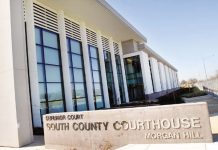Six years and 3,000 miles of fleeing couldn’t stop the long arm
of the law from reaching two brothers, who allegedly left a Gilroy
man for dead after shooting him three times in the head at close
range.
Six years and 3,000 miles of fleeing couldn’t stop the long arm of the law from reaching two brothers, who allegedly left a Gilroy man for dead after shooting him three times in the head at close range.
The Spartanburg County Sheriff’s Office arrested David Herrera, 30, and Silvestre Herrera, 27, both of Gilroy, without incident Thursday evening in Campobello, South Carolina, about five miles south of the state’s border with North Carolina, after receiving a tip from the Santa Clara County Sheriff’s Office.
The duo was wanted in the shooting of a Gilroy man police said they tossed over an embankment and left for dead on Hecker Pass Highway near Pole Line Road around 1 a.m. Jan. 14, 2003. Local law enforcement agencies were alerted to the shooting by a 911 call when a motorist driving in the area saw the bloodied victim crawling from a ditch on the side of the road, police said. The victim, who Sgt. Don Morrissey described as an “associate” of the brothers, had been riding in the same car with the Herreras before he was shot three times at close range and dumped into a ravine. After climbing out of the ravine, the victim identified the Herreras as the shooters.
During the investigation, Santa Clara County Sheriff’s Sgt. Dean Baker learned that the brothers may have fled to Mexico, Morrissey said. Upon further investigation, he learned that the duo had been seen in Texas, Arizona and finally North Carolina.
About a week before the brothers’ arrest, the Santa Clara County Sheriff’s Office got an anonymous tip that the Herreras were in Spartanburg and passed the information on to the Spartanburg Sheriff’s Office, Morrissey said.
Armed with search warrants, Spartanburg deputies were dispatched to what appeared to be a “mom and pop mechanic shop” on Highway 11 in Campobello, said Master Deputy Tony Ivey with the Spartanburg Sheriff’s Office. Before approaching the business, deputies observed a vehicle enter the business and then leave moments later, Ivey said. Deputies stopped the vehicle on Interstate 26 out of sight from the repair shop and identified the driver as Silvestre Herrera by a photo and another distinctive trait – two missing fingertips on his left hand, Ivey said.
Simultaneously, officers surrounded the repair shop and placed three men, including David Herrera, under arrest. David Herrera, who was was identified by a scar on his forehead, and his brother remain in custody at the Spartanburg County Detention Facility awaiting extradition back to California, Ivey said. The two are being held on fugitive from justice warrants until Santa Clara County sends for them, Ivey said. If they fight extradition orders, a series of hearings could delay their return to California by about a month. According to Morrissey, both Herreras had a $1 million warrant out for their arrests and, if bail is granted, he expected an equally high amount.
Two other men, German Lazo-McGarry of Tampa, Florida, and Benito Murillo, of an unknown address, were arrested for possession with intent to distribute marijuana and possession with intent to distribute cocaine, respectively, after officers found three pounds of marijuana on the premises.
Though deputies were not able to establish how closely associated the four arrestees were, Ivey said Lazo-McGarry and Murillo were at least “in the wrong place at the wrong time.”
Given the amount of drugs found at the business, “we surmised they were probably dealing drugs out of there too, as well as doing auto repairs,” Ivey said.
Though Spartanburg deputies did not know how long the brothers had been hiding out in South Carolina, they said David Herrera had been there since at least June 2007, based on police records documenting driving charges Herrera faced under a different alias. Ivey said they had no criminal record of Silvestre Herrera, however.
Both agencies attributed the Herreras’ capture to a “great collaborative effort.”
“It doesn’t matter what jurisdiction, everybody has taken an oath to serve their communities and the citizens of the U.S.,” Morrissey said. “To work across state lines shows that jurisdictions know no boundaries.”















